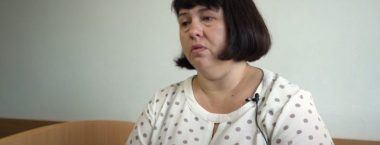
“People in their homes were dying from cold” – a nurse from Kharkiv
Interview by Taras Viychuk – I am 42 years old. I live and work in...
17 May 2022
06.04.2017
Anastasiia Martynovska comes from Krym. She has a Bachelor’s and Master’s degrees in Law from the Academy of Advocacy of Ukraine.
Since 2013, she has headed the NGO “Regional Center for Human Rights“ in Sevastopol. After the occupation of the Crimea, she moved to Kyiv. Now she works at the Strategic Litigations Center of UHHRU. Among the priorities of Anastasiia Martynovska are applications to the European Court of Human Rights (ECHR), work in the field of the execution of judgments of ECHR and issues related to the effectiveness of investigations.
– Please share your history of involvement in the human rights movement in Ukraine. Why did you decide to work in this field?
– My father is a lawyer. When we traveled together, he usually talked about his cases. This happened during the time of my schooling and college. I was very impressed by his stories. In particular, I am interested in the activities of the European Court of Human Rights. This is what inspired me to protect human rights.
While studying at the Institute, I worked as a volunteer with UHHRU. Then we created the Sevastopol human rights organization “Regional Center of Human Rights” (which operates now in Kyiv because of the understandable reasons, but still continues to protect the rights of Crimeans). Then I began to understand what human rights protection is.
The most significant contribution to my knowledge had provided the project “Distance Human Rights Education of Attorneys and Lawyers” part of the program “International law to protect the public interest”, organized by the Network of Human Rights Houses. This project is the most powerful and thorough human rights training, I have ever met.
In March 2014, during the so-called referendum, I was on training in Strasbourg, and when I returned to Sevastopol, almost immediately decided to move to Kyiv. Just then a vacancy at UHHRU was opened, and I was taken to the “family.” So I started working at the largest human rights organization in Ukraine.
– Where have you got education and knowledge of human rights?
– I obtained the education in Law at the Academy of Advocacy of Ukraine. Interesting lectures for lawyers and attorneys (e.g., by ECHR lawyer Hanna Yudkivska) were often held there, and we, the students, had the opportunity to be present there. In 2013, I gained the first experience of the human rights training – the Kharkiv Human Rights School. In 2014, I took part in the training that was held at the Center for International Protection (Centre de la protection internationale) in Strasbourg. Thanks to it, I met such masters in their field as Oksana Preobrazhenska, Kyrylo Korotieiev, Kostiantyn Dehtiarev. Then there were shorter training sessions – for one or two days.
The most significant contribution to my knowledge had provided the project “Distance Human Rights Education of Attorneys and Lawyers” part of the program “International law to protect the public interest”, organized by the Network of Human Rights Houses. This project is the most powerful and thorough human rights training, I have ever met. It not only provided knowledge about the theory but also answered the question how to use them in practice. And thanks to this program, I have gained a huge amount of new acquaintances, people who were experts in my eyes – Pavlo Parkhomenko, Denys Rabomizo, Olha Semeniuk, Vira Mihailenko, Olena Diemienieva and many others.
– What is your area of focus in the field of human rights?
– It’s hard to name only one topic. A large number of cases, which I work on, are about problems that emerged after the occupation of the Crimean peninsula. These cases are about violations of the rights to liberty, life, freedom of assembly by the Russian occupation authorities, and the right of access to justice, the right to vote, the right to property by the Ukrainian government.
I dealt with topics related to the protection of prisoners’ rights, in particular – the prohibition of slave labor. An interesting topic that I dealt with, although it was not related to the protection of an individual is the execution of judgments of the European Court of Human Rights (ECHR). We analyzed the state of their execution in our country in terms of total liabilities, such as the need for changes in law and practice. We provided our comments to the Committee of Ministers, which monitors the implementation of decisions of the Court, on this occasion.
– Did you work with the theme of women’s rights?
– I was not involved in gender issues, although I am interested in protecting victims of domestic violence (in most cases, these are women and children). At the same time, I helped women, who had some problems. In my opinion, men could also be in this situation.
For example, we tried to help a woman whose child was left on the uncontrolled territory by Ukraine in the East. She is a single mother and raised her son alone. Representatives of the so-called “republics” took her child and tried to deprive her of parental rights.
Also, we submitted an application to ECHR on slave labor in women’s colony in Odesa Oblast.
– In your opinion, what are the greatest successes of the human rights movement in Ukraine?
– I cannot talk about the greatest successes. I think that success in human rights protection is difficult to measure. Recently, my colleague, Nina Khoma, won the case against Oshchadbank, which refused to return the deposit. Her client, an elderly man, was paid back those savings, which he collected for the education of his grandchildren. For this man, the said success of advocacy – restoration of the right to private property – is the greatest success. Although this case may still be unknown for human rights defenders.
People, who are constantly working with law enforcement and investigation, noted that in recent years the number of cases of torture to obtain confessions has reduced. While human rights activists, who are engaged in different cases, could not see this improvement.
It is important that these successes exist. The fact is that we are constantly moving forward. That legal framework in the country is gradually changing for the better.
– What are challenges of the modern human rights movement in Ukraine?
– There are many challenges. In my opinion, the hardest thing is to change the people’s mindset. You can fire judges, prosecutors, investigators, but same people with the same old and crippled views will replace them. We must change the people’s understanding of human rights, of the law, in general.
There are many challenges. In my opinion, the hardest thing is to change the people’s mindset. You can fire judges, prosecutors, investigators, but same people with the same old and crippled views will replace them.
All changes require complex solutions. Now the government often tries to fix symptoms instead of solving problems that are the cause of these symptoms. It is difficult to solve problems comprehensively, but this cannot be achieved without real change.
– In your opinion, is it enough attention paid to gender issue by the human rights movement?
– I am convinced that there are still many unresolved problems in the field of gender advocacy. Fortunately, now there are many organizations that are to some extent dealing with women’s rights (e.g. the Center “La Strada-Ukraine”, the Ukraine-wide Network of Centers for Gender Education, the Coalition to Combat Discrimination in Ukraine, the Ukraine-wide Charity Organization “Positive Women”) and conducted a large number of educational and awareness programs on gender issues.
– Gender-based violence is a serious problem, particularly in Ukraine. In your opinion, what should be done to improve the situation?
– As I said before, this issue, like others, requires a comprehensive solution. A complete program that touches all aspects of the problem – psychological, legal, social, economic, political and so on, should be developed.
First of all, it should be done for victims of violence to avoid the feeling of guilty, if they apply to the police. The police, in turn, must respond adequately to allegations of abuse in the family, and not close eyes for such statements referring to the fact that these are household conflicts that should be resolved within the family.
There are many preventive measures that will help to reduce the level of violence significantly.
– What or who inspires you the most in your human rights work?
– My “teachers” are Roman Martynovskyi, my father, Serhii Zaiets, Arkadiy Bushchenko, Kyrylo Korotieiev, Hanna Yudkivska. My colleagues and friends are the whole team of the Strategic Litigations Center of UHHRU, attorneys and lawyers with whom I met during training programs. All these people for me are examples of dedication, professionalism, sustainability and invincible spirit.
I am also inspired by the belief that we can change the country for the better. It gives power in the most difficult professional situations.
Prepared by Tamara Martseniuk
If you find an error on our site, please select the incorrect text and press ctrl-enter.

Interview by Taras Viychuk – I am 42 years old. I live and work in...
17 May 2022

The Kharkiv Human Rights Group (KHRG) is documenting international crimes (genocide, crimes against humanity, war...
14 April 2022

The Global initiative “Tribunal for Putin” invites to a closed online event “Kyiv region under...
12 April 2022

The Global initiative “Tribunal for Putin” invites to a closed online event “Kyiv region under...
12 April 2022